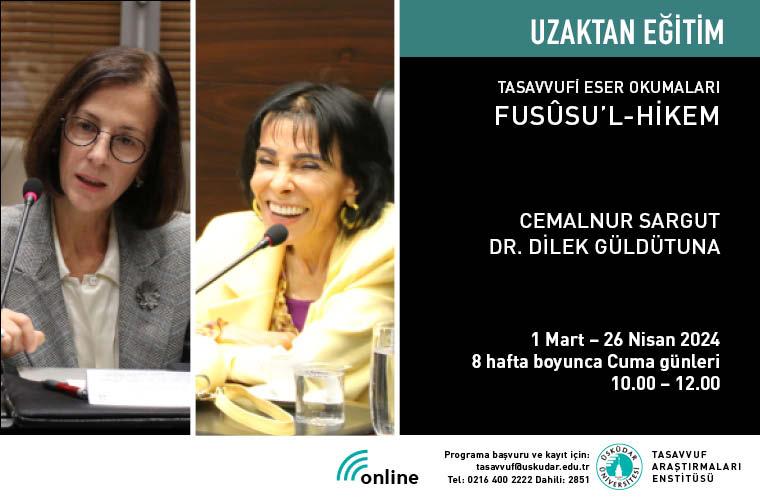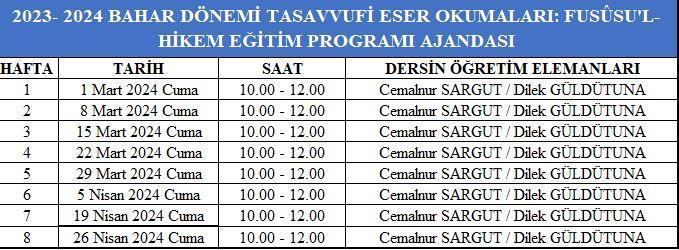
TECHNICAL SPECIFICATIONS
The programme lasts 8 weeks.
It is a total of 16 hours training programme.
It is between 1 March - 26 April 2024.
Friday 10.00 - 12.00
Programme fee: 3.350 TL (including VAT)
Fee for Participants from Abroad: 120 EURO
For information about registration to the programme, CLICK HERE.
*** Simultaneous recordings of the lectures are taken and uploaded to the system. Participants will have access to the course videos for 6 months.
Participants who have completed their payment transactions are kindly requested to send their payment information to tasavvuf@uskudar.edu.tr.
SCOPE
Ibn 'Arabī (1165-1240), also known as Muhyiddīn (the reviver of religion) or Shaykh al-Akbar (the greatest Shaykh), is a Sufi who, in his spiritual and spiritual journey from Andalusia to Damascus, united the East and the West in his works, interpreted and combined different disciplines, philosophical and mystical views without excluding them, and combined them with his knowledge. In the Islamic world, there is no scholar who has left such a dominant and profound influence as he has, and in the West, few Muslim scholars are as well known as he is.
Osman Yahya mentions some 550 works written by Ibn 'Arabî, ranging in volume from two pages to the 37-volume Futûhât al-Makkiyya, of which over 300 have survived, most of them still in manuscript form.
Although he is sometimes unfairly referred to as a theoretician because of his systematisation of many Sufi ideas and concepts, in his works, as he repeatedly emphasised, he described the knowledge he had experienced and enjoyed, and, as his disciples put it, theory and practice were inextricably intertwined in his works.
In addition to the large number of his works, two works in particular, the Futûhât al-Makkiyya and the Fusus al-Hikam, have been highly influential as the two works that best reflect Ibn 'Arabî's legacy. In contrast to the Futûhât al-Makkiyya, which deals with a wide range of subjects in detail, the Fusus al-Hikam, written in Damascus in 1229, is considered the summation of his works with its depth and intensity. For this reason, around 120 commentaries were written on the work, the first of which was Ibn 'Arabî's own, and the work, which was initially read in small circles, gradually became known in wider circles and has continued to be the centre of attention until today.
The title of the work also reflects its content. Consisting of 27 chapters, each chapter is devoted to a prophet mentioned in the Qur'an, and a divine wisdom that is revealed in him is described. As expressed in the holy hadith as "Hidden Treasure", although God is unknowable and incomprehensible in His essence, the universe is the place of manifestation and manifestation of God, and the perfect human being, who is the caliph of God, is the perfection of this manifestation and the purpose of creation. By realising the wisdom manifested in each prophet's word, that is, in his truth, a new door opens for man in knowing the Truth. Hz. Muhammad is the khattam al-anbiyâ, the Seal of the Prophets, because he is the last of the prophets, he constitutes the totality of words (jawāmi'u'l-kelim) in that he confirms, completes and unites all prophets, and he unites the beginning and the end of creation in that he is the perfect manifestation of the Truth-i Muhammadiyya. For this reason, understanding other prophets and their wisdom has been instrumental in understanding and recognising the Prophet Muhammad, the Truth.
AGENDA

